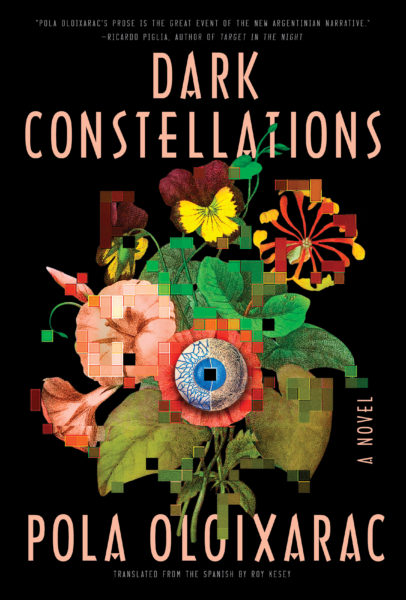Dark Constellations: A Novel by Pola Oloixarac
Reviews
By Robert Rea
A rgentina has something of a tradition when it comes to heady science fiction. Adolfo Bioy Casares’s The Invention of Morel was famously hailed as a masterpiece by Borges. And this is to say nothing of Borges, himself a master of cerebral sci-fi. That tradition continues with Pola Oloixarac, a madly inventive writer, and not just because she dares to imagine the future.
Dark Constellations dwells on those fork-in-the-road moments in the evolution of our species. The story is told in three parts, each set in a different century. It begins in 1882 with a group of explorers on the Canary Islands, where a series of deranged bacchanals casts a pall over the expedition and its legacy. Reports from plant biologist Niklas Bruun are shrouded in mystery, but among the discoveries is a mind-melting substance “whose properties would remain all but unknown until the beginning of the twenty-first century.”
Flash forward to 1980s Buenos Aires. Cassio Brandão da Silva is a chubby kid with a fondness for Teenage Mutant Ninja Turtles and hacking the world’s most complex computer systems. He stumbles awkwardly through adolescence, tinkering with a new breed of stealth viruses “that could learn from their own mistakes.” A Gen-Xer through-and-through, Cassio lacks direction until he meets Max Lombard, a Tyrell-like operator with a devious agenda. The first time they hang out, Max (while tapping his steepled fingers, I like to imagine) sells Cassio on the idea that “algorithms are like a new adaptive species.”
The year is 2024, and Cassio is working on a secret project for a tech start-up helmed by Max. My understanding is that the company deals in data-stealing malware; only in this case the data is human DNA. This is an urgent novel for these times of data mining and mass surveillance, with all the moral and ethical questions those developments raise. But Ms. Oloixarac isn’t simply taking shots at big tech here. Cassio and Max, like all the best mad scientists, are reaching for something beyond the known world. In doing so, they ignore the dangers of unleashing a force they can’t control. “We have to understand these things as dark constellations—that’s what the Incas called them,” Max explains in a self-justifying monologue. “They organized the sky in terms of the dark regions between stars. But what creates space for meaning isn’t the bright dots or the presence of light. What matters is the darkness.”
The book’s murky conclusion doubles as its own dark constellation. Without spoiling its many surprises, I’ll only say that things take a trippy turn, before plunging headlong into whatever-the-hell-comes-next. Oloixarac’s jargon-packed prose can make reading feel like taking a test you haven’t studied for, though I suppose this is in the service of creating a world where our tech capacities have outstripped our capacity to fully understand them. In that vein, Dark Constellations delivers exactly what you want in high-end science fiction—a deep thinker of a novel with a wide-eyed gusto for getting weird.
Robert Rea is the deputy editor and web editor for SwR.
More Reviews



